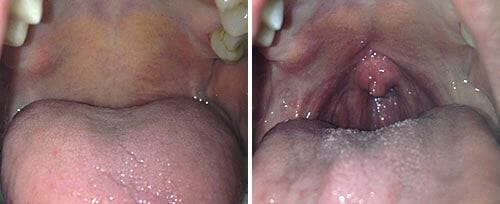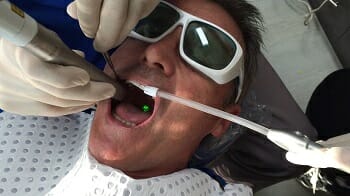About Nightlase Treatment
For years, the CPAP and Oral Appliance have ruled when it comes to treating snoring and sleep apnea. Now, newer laser snoring technology is capturing the attention of those who are seeking treatment. More specifically, we are talking about Nightlase Lightwalker laser by Fotona. Fotona has been working in the laser industry for over 50 years and is a world leader in medical lasers. In the past, this type of technology was only used to reduce the appearance of wrinkles or for vaginal rejuvenation. Only recently has this type of laser treatment been approved for oral use.
How Does It Work?

Before and After NightLase Treatment
It’s a common misconception that snoring originates from the nose. Many people believe snoring is related to the shape of their nose or due to an injury to the nose earlier in life. While nasal issues can cause snoring, this is typically not the area in which snoring comes from.
In most cases, snoring originates in the throat and is caused by parapharyngeal tissue that have become loose due to aging. As with other areas of our body, aging takes its toll and muscles lose tone and begin to sag. When this occurs in the pharynx area, the airway becomes restricted as air tries to pass by. As air moves past this restriction it forces these airway tissues to collide with each other. The collision of parapharyngeal tissue generates the sound of snoring. In essence, the sound of snoring is simply created by old worn and sagging airway tissues smacking against each other.
You may be wondering why the sound of snoring doesn’t exist when you are awake. There’s actually a very simple explanation for this. While awake, the airway is stimulated which keeps it tight. As you fall asleep, muscles in the body begin to relax, including those in the airway. The sound of snoring becomes more pronounced when alcohol and sedatives are use before bed. This explains why your wife often complains about heavy snoring after you drink alcohol and then fall asleep.

NightLase procedure
Mandibular Advancement Devices are often prescribed to hold the jaw forward and tighten these loose muscles. The Nightlase effectively tightens the area around the soft palate by use of their patented Lightwalker dental laser that helps to simulate the creation of new elastic collagen which does not sag and interfere with breathing as you sleep.
The procedure is non-invasive, requires no anesthetics and only takes a few minutes to complete and is typically conducted within your dentist’s office. Your dentist will carefully run the Lightwalker laser around the uvula area. This laser uses Er:YAG wavelengths to shrink and tighten the tissue. During the procedure, you may feel a slight warming sensation and afterward, your throat may become slightly scratchy for perhaps a day or so. Since the laser does not actually cut the tissue there’s no stitching or concerns of infection.
After the initial procedure, you will need to return two more times over the next six weeks for another treatment. Treatments are typically spaced out three weeks apart and involve another pass of the laser.
Is NightLase A Permanent Solution?
Nightlase rejuvenates old and weakened tissue. As we progressively age, these tissues will eventually lose elasticity once again and snoring will reemerge. Due to the fact that aging is an ongoing process, the Lightlase is not a permanent solution. You will need to go in for “touch-up” procedures every six to eighteen months and require a quick office visit.
NightLase Effectiveness
How effective is the NightLase procedure? It’s estimated that up to 80% of patients report success in reducing the frequency and intensity of snoring. While 80% may not seem overly promising, statistically speaking, it’s one of the most effective snoring solutions available.
How much does the NightLase Treatment Cost?
 Using NightLase to treat your snoring may be less costly than you think. While the cost of laser treatment will vary depending upon region as well as the office performing the procedure, we can offer a ballpark figure which can help you decide if this treatment option is worth the cost.
Using NightLase to treat your snoring may be less costly than you think. While the cost of laser treatment will vary depending upon region as well as the office performing the procedure, we can offer a ballpark figure which can help you decide if this treatment option is worth the cost.
In general, most physicians are going to charge a fee for an initial consultation. This fee may be somewhere between $200 and $300. The actual procedure costs approximately $500 per visit/ treatment. Since three initial treatments are expected, you can expect the total cost to be somewhere around $1,700 – $1,800 depending on location and choice of doctor. You should also consider the cost of touch up visits every year or so which will cost about $500 per visit. Fortunately, touch-ups are typically only one visit.
Is It Worth The Cost?
 With an 80% success rate, NightLase seems to be one of the more effective snoring solutions available. Being non-invasive and not causing any permanent changes in the structure of the airway are two desirable features of this procedure compared to surgeries that are permanent and can cause complications later down the road. With the NightLase, you will not be dependent on the nightly use of oral appliances.
With an 80% success rate, NightLase seems to be one of the more effective snoring solutions available. Being non-invasive and not causing any permanent changes in the structure of the airway are two desirable features of this procedure compared to surgeries that are permanent and can cause complications later down the road. With the NightLase, you will not be dependent on the nightly use of oral appliances.
As you can see, there are several benefits associated with choosing the NightLase treatment for your snoring. The initial cost and ongoing costs may determine whether or not a person chooses this treatment option. For some, the price tag may be cost prohibitive while others may not have an issue paying the price.
If you are on the fence due to the cost of the procedure, you may want to consider if there are any financing options available which will make the cost more manageable.
If the cost will put a strain on your budget, you may want to consider trying out an oral appliance, also known as a “snoring mouthpiece”. Several snoring mouthpieces are over 80% effective and most cost well under $100, which is a more budget-friendly option. I have been an oral appliance proponent for several years now and have tested several of them.
Deciding if NightLase if worth the cost is a personal decision that should be made while considering if the procedure fits into your budget.
Share This Post: